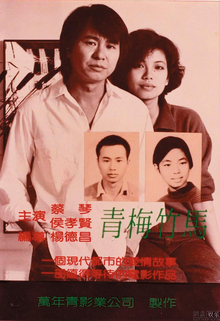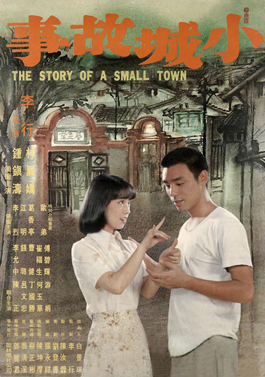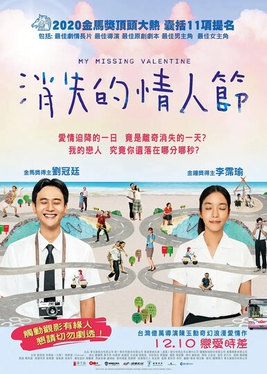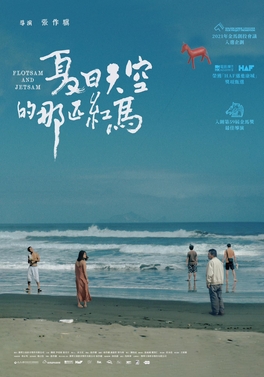Related Research Articles

Hou Hsiao-hsien is a Mainland Chinese-born Taiwanese film director, screenwriter, producer and actor. He is a leading figure in world cinema and in Taiwan's New Wave cinema movement. He won the Golden Lion at the Venice Film Festival in 1989 for his film A City of Sadness (1989), and the Best Director award at the Cannes Film Festival in 2015 for The Assassin (2015). Other highly regarded works of his include The Puppetmaster (1993) and Flowers of Shanghai (1998).

Flowers of Shanghai is a 1998 Taiwanese drama film directed by Hou Hsiao-hsien. It is based on the novel The Sing-song Girls of Shanghai (1892) by Han Bangqing, which was originally written in the Wu language (吳語) and translated into Mandarin Chinese by Eileen Chang. The film stars Tony Leung as a wealthy patron and Hada Michiko, Annie Shizuka Inoh, Shuan Fang, Jack Kao, Carina Lau, Rebecca Pan, Michelle Reis, and Vicky Wei as "flower girls" in four high-end Shanghai brothels. It was voted the third best film of the 1990s in the Village Voice Film Poll conducted in 1999. The film was selected as the Taiwanese entry for the Best Foreign Language Film at the 71st Academy Awards.

Wu Nien-jen is a Taiwanese screenwriter, director, and writer. He is one of the most prolific and highly regarded scriptwriters in Taiwan and a leading member of the New Taiwanese Cinema, although he has also acted in a number of films. He starred in Edward Yang's 2000 film Yi Yi. Wu is a well-known supporter of the Democratic Progressive Party and has filmed commercials for the party.

Dust in the Wind is a 1986 Taiwanese film directed by Hou Hsiao-hsien. It is based on co-screenwriter Wu Nien-jen's own experiences, and is the first of a trilogy of Hou and Wu's collaborations, the others being A City of Sadness (1989) and The Puppetmaster (1993).

The Time to Live and the Time to Die, also known as A Time to Live, A Time to Die is a 1985 Taiwanese film directed by Hou Hsiao-hsien. This film is inspired by Hou's own experience of growing up in Fengshan, Kaohsiung city. It is the second part of Hou's coming-of-age trilogy, preceded by A Summer at Grandpa's (1984) and followed by Dust in the Wind (1986).

Taipei Story is a 1985 Taiwanese film directed by Edward Yang — his second full-length feature film and third overall. The film stars Hou Hsiao-hsien and singer Tsai Chin to depict the grinding relationship of Ah-lung and Ah-chen, who have known each other since childhood in Taipei. It is doomed to fail because Ah-lung cannot forget about the past while Ah-chen is eager to embrace the future as Taipei undergoes modernization and globalization. Taipei Story is one of the representative films of the New Taiwanese Cinema. It won the FIPRESCI Prize at the 38th Locarno Film Festival in 1985.
The Boys from Fengkuei, also known as All the Youthful Days, is a 1983 Taiwanese film directed by Hou Hsiao-hsien. The movie is about a group of impulsive teenagers with nothing to do and high energy. While waiting to be enlisted in the army, they cause trouble in their hometown, Fengkuei, and run away from Penghu to Kaohsiung. From a small town to a big city, through the depression and turmoil of youth they experience unforgettable life scenery and gradually recede from their original youthfulness. It was Hou Hsiao-hsien's first art film after he directed three light comedies in the early eighties and a representative work of the Taiwan New Cinema at its inception.

Dust of Angels is a 1992 Taiwanese crime film directed by Hsu Hsiao-ming, executive produced by Taiwanese filmmaker Hou Hsiao-hsien. It was entered into Directors' Fortnight at the 1992 Cannes Film Festival. "An lah" (安啦) is a Taiwanese Hokkien colloquialism; the title in full roughly translates to "take it easy, lad" or "cool it, kid."

Li Hsing or Lee Hsing (李行) is a Taiwanese film director. He was born Lee Tz-da (李子達) in 1930 in Shanghai and died in 2021. He made one of the early popular Taiwanese films in the late 1959, Wang and Liu Tour Taiwan (王哥柳哥遊台灣), though he did not speak Taiwanese. He was also the key director in the promotion of Healthy Realist film (健康寫實片) and Literary Romantic film (愛情文藝片). He was awarded the best director at Golden Horse Awards three times and had seven films awarded the best feature film: Beautiful Duckling, The Road, Execution in Autumn, Land of the Undaunted,, He Never Gives Up, The Story of a Small Town, and Good Morning, Taipei. After he made his last film The Heroic Pioneers, he vowed to be the lifetime volunteer for the promotion of development of Taiwan cinema. In 2009 he established the Cross-Strait Films Exchange Committee, which has been the main, if not only, organization promoting the interaction and cooperation of Taiwanese and Chinese filmmakers. Lee Hsing is often referred to as the “godfather of Taiwan cinema” for his great contribution to Taiwan cinema.

The Story of a Small Town is a 1979 Taiwanese film, produced by Hsiao Chung Productions (小眾電影公司). The film revolves around a family living in a small town. Kenny Bee plays the male family member who is released from prison and falls in love with a mute woman.
Hou Chi-jan is a Taiwanese director and writer. His works are often related to historical memories.
Chang Yi was a Taiwanese film director.
Chen Ming-chang (陳明章) is a Taiwanese folk singer, guitarist, Taiwanese yueqin player, composer, and producer born in Beitou. He is known for writing scores for the Hou Hsiao-Hsien films Dust in the Wind (1985) and The Puppetmaster (1993), as well as for songs such as "She Is Our Darling" and "Wandering to Tamsui". He is stylistically known for singing primarily in Taiwanese Hokkien, incorporating traditional styles and instruments into his music, as well as songs that represent the Taiwanese underclass.

Central Motion Picture Corporation, also known as Zhong Ying (中影) was established in 1954. It was formed through the merger of the Agricultural Education Film Company and Taiwan Film Company. Like China Television Company and China Broadcasting Corporation, it was operated under the party of Kuomintang (KMT) as well as the government.

My Missing Valentine is a 2020 Taiwanese romantic comedy film written and directed by Chen Yu-hsun, and starring Liu Kuan-ting, Patty Lee. The film was released in Taiwan on September 18, 2020, and it was selected for Open Cinema of the 25th Busan International Film Festival on October 29. It received 11 nominations at the 57th Golden Horse Awards, winning Best Feature Film, Best Original Screenplay, Best Visual Effects, Best Film Editing and Best Director for Chen.

Flotsam and Jetsam is a 2022 Taiwanese drama film written and directed by Chang Tso-chi.
The Golden Horse Lifetime Achievement Award is an award presented annually at the Golden Horse Awards by the Taipei Golden Horse Film Festival Executive Committee. The latest ceremony was held in 2023, with Brigitte Lin and Chen Kun-hou receiving the honors.
Liao Ching-Sung, also known as "Liao-san" (廖桑), is a Taiwanese film editor, known for his work with Taiwanese New Wave directors such as Hou Hisao-Hsien, Edward Yang and Wan Jen. He has received numerous accolades including two Golden Horse Awards for Outstanding Taiwanese Filmmaker of the Year, as well as the Special Contribution Award of Golden Horse Awards in 2018.
Singing Chen is a Taiwanese film director, documentary filmmaker, and music composer. She graduated from Advertising in the Department of Mass Communication at Fu Jen Catholic University in 1997. Her works primarily focus on topics related to humanities and arts and culture, and she uses a magical realism approach to establish her visual style. She has received numerous international and domestic awards nominations for her work.
Taiwan New Cinema was a film reform movement initiated by young Taiwanese filmmakers and directors which took place from 1982 to 1987. Taiwan New Cinema films primarily showcase a realistic style with their depictions of subject matter close to the social reality, offering a retrospective look into the lives of the common people. Taiwan New Cinema brought about a new chapter for the cinema of Taiwan with its innovative form and unique style.
References
- 1 2 3 4 5 6 "製片-陳坤厚". TFAI-國家電影及視聽文化中心 Taiwan Film and Audiovisual Institute. Retrieved 2023-06-13.
- ↑ "1983 台湾票房 | 中国票房 | 中国电影票房排行榜" (in Chinese (China)). Retrieved 2023-06-13.
- ↑ 林, 文淇 (2012-12-01). "鄉村城市:侯孝賢與陳坤厚城市喜劇中的臺北". 藝術學研究. 11.
- 1 2 "陳坤厚". 台灣電影網. 2022-07-27.
- ↑ 黃, 娟綺 (2009-04-15). "更寬廣的空間、更亮麗的天空--訪「新魯冰花」導演陳坤厚". 台灣電影網.
- ↑ Wang, Hsin-yu; Lin, Sean (23 June 2023). "Golden Horse honors actress Brigitte Lin and director Chen Kun-hou". Central News Agency. Retrieved 23 June 2023.